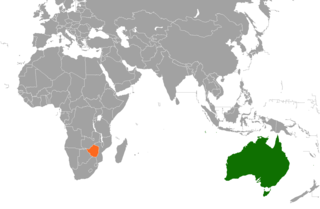
Foreign relations of Australia are influenced by its position as a leading trading nation and as a significant donor of humanitarian aid. Australia's foreign policy is guided by a commitment to multilateralism and regionalism, as well as to build strong bilateral relations with its allies. Key concerns include free trade, terrorism, refugees, economic co-operation with Asia and stability in the Indo-Pacific. Australia is active in the United Nations and the Commonwealth of Nations. Given its history of starting and supporting important regional and global initiatives, it has been described as a regional middle power par excellence.

The foreign policy of Solomon Islands as of 2008 was described by the Solomon Islands government as a "look north" policy, aimed as strengthening diplomatic and economic relations with Asian countries for development purposes.

Dalton is a small inland country town in the Southern Tablelands of New South Wales, Australia in Upper Lachlan Shire.

Gorokan is a suburb of the Central Coast region of New South Wales, Australia. It is part of the Central Coast Council local government area. The word "Gorokan" means "The Morning Dawn" from the language of the Awabakal. There are two schools in the area, Gorokan Public School and Gorokan High School. Electricity was first brought to the area as a part of a £42,000 programme for electricity reticulation under the Brisbane Water County Council. Located on the shores of Lake Tuggerah, Gorokan has long been a holiday destination with the Quoy family first buying land in the area in 1923 where they built and rented a series of holiday homes. Other families such as the Gedlings built a holiday house on the Gorokan waterfront in 1956.
The Hospitals Contribution Fund of Australia, commonly referred to as HCF, is an Australian private health insurer headquartered in Sydney, New South Wales. Founded in 1932, it has grown to become one of the country's largest combined registered private health fund and life insurance company. HCF is the third-largest health insurance company by market share, and is the largest not-for-profit health fund in Australia.

Leslie Oswald Sheridan Poidevin was an Australian tennis player and first-class cricketer who played for New South Wales and Lancashire.

Alan Phillip Renouf OBE was a prominent Australian government official during the 1970s.

Foreign relations exist between Australia and Zimbabwe. Both countries have full embassy level diplomatic relations. Australia currently maintains an embassy in Harare, and Zimbabwe maintains an embassy in Canberra.
Gundagai lore is associated with Gundagai, Australia, a place of considerable reputed Aboriginal cultural significance, with both archaeological sites and anthropological associations related to sacred and spiritual beliefs of the local clan group and wider cultural associations.
The Goulburn Chronicle and Southern Advertiser was a weekly English language newspaper published in Goulburn, New South Wales from 1855–1864.
John Charles George Kevin was an Australian public servant and diplomat.

George Barron Goodman, also known as George Baron Goodman, was a practitioner of the Daguerreotype in the 1840s and Australia’s first professional photographer. He was also one of the first to hold the rights to use Daguerre's process in the British Colonies.









